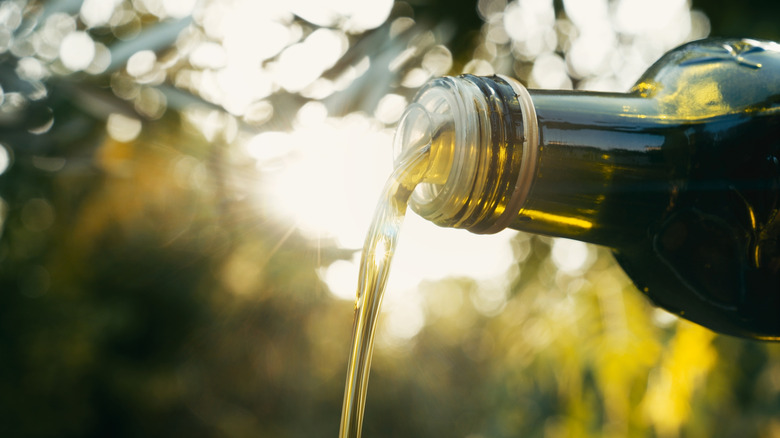
Kelly Sullivan/Getty Images
Much like a fine bourbon or a well-aged wine, artisanally made olive oil has become a coveted item among the prized collections of serious food lovers. Food Network icon and Georgia native Alton Brown is especially “crazy about” a green, bright, and fruity olive oil produced in his home state (according to Food Network). Georgia Olive Farms is pioneering olive cultivation in the Peach State. Located in Lakeland, Georgia, it currently produces two varieties of olive oil. The Arbequina olive oil goes for $43 a bottle, and the Chef’s Blend olive oil comes in at $38 for a 500ml bottle, placing both in the premium olive oil category. But is Brown’s go-to olive oil truly worth the splurge?
The journey from olive branch to bottle plays a major role in the quality of olive oil. Georgia Olive Farms follows USDA extra‑virgin standards. This means that after harvesting, the olives have to be pressed within 24 hours. Freshness unlocked. Crafted from olives grown on Arbequina and Koroneiki trees that were planted in Georgia in 2009, the smoothness of the Arbequina olive is blended with the boldness of the Koroneiki olive, resulting in the balanced yet versatile Chef’s Blend olive oil. For a buttery oil paired with sourdough bread for dipping or drizzled over a baked goat cheese salad with walnuts and cherries, the Arbequina olive oil adds depth and nutty notes to any dish. The quality and unique craftsmanship of Georgia Olive Farms’ olive oil sets it apart from many of the imported blends that flood supermarket shelves.
What’s with the price tag?

sebra/Shutterstock
When shopping for the right olive oil, a bottle priced at a $38 to $43 price tag might raise an eyebrow or two, but there are legitimate reasons for that hefty number. Farming costs like hand harvesting and small-batch processing can hike up the price. Georgia Olive Farms also takes on the challenge of transporting freshly picked olives for pressing within the government-regulated 24-hour window. To maintain extra-virgin olive oil standards and the purity of the oil, meticulous attention is paid to cultivating this crop. This is no ordinary operation.
Many of the olive oils found in supermarkets in America are mass-produced imports. Olive oils produced in the U.S. have to adhere to strict labeling and quality regulations. That means no fillers, like vegetable oil, and full transparency from the grove to the bottle. When you buy domestically produced olive oil, you are not only investing in small-batch craftsmanship, you are also supporting U.S. farmers and their commitment to providing local products that are grown with integrity.
Much like investing in a high-quality knife for your collection or a tin of Italian truffles, artisanal olive oil can be a small upgrade that delivers big results in your kitchen. Dip a toe in southern innovation and pour it over a platter of grilled Georgia peaches with fresh basil, or use it as a base for a homemade salad dressing. The options are endless when it comes to high-quality olive oil. Alton Brown’s love for Georgia Farms Olive Oil could be as simple as hometown pride, but the flavor, craftsmanship, and story of this olive oil speak for themselves.

